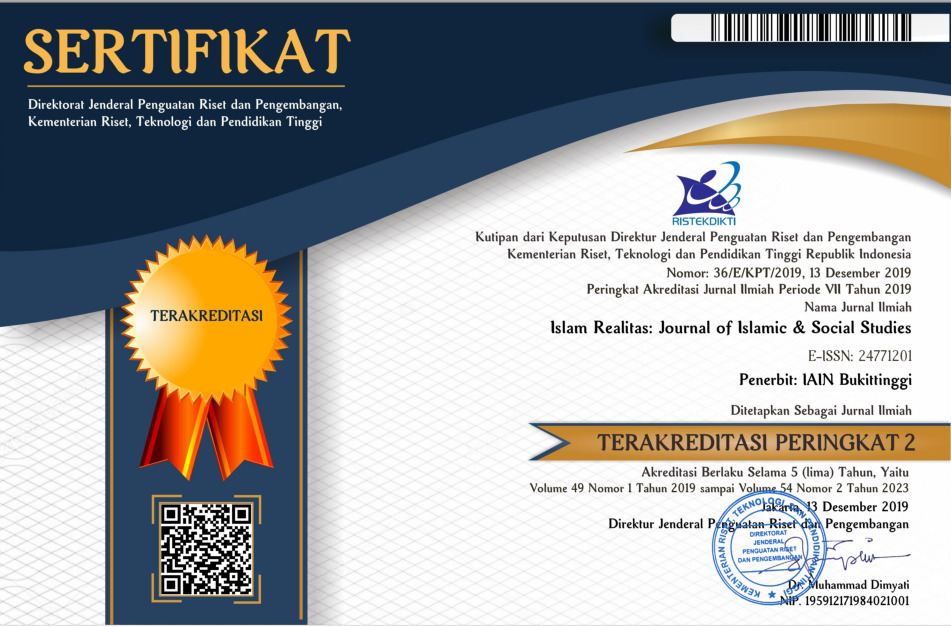The Holistic-Dialogical Paradigm of Mulyadhi Kartanegara: A Study of the Concept of Nature
DOI:
https://doi.org/10.30983/fuaduna.v6i2.5519Keywords:
Mulyadhi Kartanegara, Holistic-Dialogical Paradigm, Nature.Abstract
Philosophers have long echoed various views about nature, but these concepts still reduce the meaning of nature itself. In recent developments, nature seems to be perceived as dead and has an identity that is very far from the side of human existence on earth. As a result, nature becomes the best and often becomes an outlet for human greed. Because of that, it is a crucial requirement to look at the latest perspective holistically in studying natural problems. This article discusses Mulyadhi Kartanegera’s holistic-dialogical paradigm in understanding the concept of nature. in answering research, data was collected through the works of Mulyadhi Kartanegara and supported by documents, books, and articles related to the object of research. The data that was collected was analyzed using descriptive-interpretative methods and holistic data analysis to get a conclusion. The research result show that nature in Mulyadhi Kartanegara’s holistic-dialogical paradigm is alive in the same sense as humans who have an awareness of intelligence and beauty. Various natural abilities, such as intelligence, can exceed human capacity. In this case, nature must be treated as a living system with self-control and regulation, called the sunnah of Allah.
References
Abiddin, Zaenal. “Kesinambungan Dan Perubahan Dalam Kajian Filsafat Islam: Studi Terhadap Pemikiran Harun Nasution, Mulyadhi Kartanegara, M. Amin Abdullah,Dan Musa Asy’arie.†Tahswir 3, no. 2 (2015).
Amin, Muhammad. “Konsep Ilmu Pengetahuan Mulyadhi Kartanegara: Kritik Terhadap Sains Positivistik.†UIN Alauddin Makassar, 2015.
Arabi, Muhyiddin Ibnu. Fushus Al-Hikam. Edisi Abu. Kairo, 1947.
Bahri, Media Zainul. “Expressing Political and Religius Identity: Religion-Science Relations in Indonesiaan Muslim Thinkers 1970-2014.†Al-Jamiah 6, no. 1 (2018).
Barnes, and Noble. Webmaster’s New Unabridged English Dictionary. New York, 1989.
Chittick, William. Imaginal Worlds, Ibn Al-Arabi and the Problem of Religious Diversity. Albany: SUNY Press, 1989.
Corbin, Henry. “En Islam Iranienne.†Galimard IV, no. 2 (1972).
Davies, Paul. God and the New Physics, n.d.
From, Erich. The Sane Society: Mexico: Kindle Edition, 1995.
Guba, Egon G. The Paradigm Dialog. California: Sage Publications, 1990.
Heriyanto, Husain. Paradigma Holistik; Dialog Filsafat, Sains, Dan Kehidupan Menurut Shadar Dan Whitehand. Bandung: Teraju, 2003.
Iretna. Islamisasi,Ilmu: Model Integrasi Mulyadhi Kartanegara. Jakarta: ICAS Sadra, 2015.
Isma‘il, Fu’ad Farid, and Abdul Hamid Mutawalli. Cara Mudah Belajar Filsafat (Barat Dan Islam), Terj. Didin Faqihudin. Yogjakarta: IRCiSod, 2012.
Jannah, Nasitotul. “Nurcholish Madjid Dan Pemikiranya (Diantara Kontribusi Dan Kontroversi),.†Cakrawala XXI, no. 1 (2017).
Kartanegara dkk., Mulyadhi. Rasa’il Ikhwan Shafa. Jakarta: Departemen Agama RI, 2004.
Kartanegara, Mulyadhi. Lentera Kehidupan : Panduan Memahami Tuhan, Alam Dan Manusia. Bandung: Mizan Pustaka, 2016.
———. Menembus Batas Waktu: Panorama Falsafah Islam. Jakarta: Mizan, 2002.
———. Mengarungi Lautan Ilmu: Otobiografi Mulyadhi Kartanegara. Jakarta: Cipsi, 2019.
———. Menyibak Tirai Kejahilan: Pengantar Epistemologi Islam. 1st ed. Bandung: Mizan, 2003.
———. Mozaik Khazanah Islam: Bunga Rampai Dari Chicago. 1st ed. Jakarta: Paramadina, 2000.
———. Nalar Religius: Memahami Hakikat Tuhan, Alam, Dan Manusia. Jakarta: Erlangga, 2007.
———. Panorama Filsafat Islam: Menembus Batas Waktu. Bandung: Mizan, 2002.
———. Rasa’il Ikhwan Al-Shafa, Buku 3 Fisika. Jakarta: Departemen Agama RI, 2007.
———. Reaktulisasi Tradisi Imiah Islam. Jakarta: Baitul Ihsan, 2006.
———. Seni Mengukir Kata: Kiat-Kiat Menulis Efektif-Kreatif. Bandung: MLC, 2005.
———. The Mystical Reflessions Rumi. Jakarta: Pustaka Jaya, 1994.
Maragustam. “Paradigma Holistik-Integratif-Interkonektif Dalam Filsafat Manajemen Pendidikan Karakter’†1, no. 1 (2012).
Masrur, Ali. “Maulana Jalaluddin Rumi (1207-1273 M): Telaah Atas Keindahan Syair Dan Ajaran Tasawufnya.†Wawasan 37, no. 1 (2014).
Matroni. “Pemikiran Mistiko-Filosofis Mulyadhi Kartanegara.†Jurnal Aqlam 3, no. 2 (2018).
Murata, Sachiko. The Tao of Islam, Kitab Rujukan Ratang Relasi Gender Dalam Kosmologi Dan Teologi Islam, Terj. Rahmani Astuti Dan M.S. Nasrullah. Bandung: Mizan, 1998.
Mutahir, Haidar. “Pemikiran Mulyadhi Kartanegara Tentang Islamisasi Ilmu Dan Relevansinya Dengan Pengembangan Ilmu Pengetahuan Di Universitas Islam.†Academia, 2016.
Nafis, Muhammad Wahyuni. Cak Nur Sang Guru Bangsa Biografi Pemikiran Prof. Dr. Nucholish Madjid. Jakarta: Buku Kompas, 2014.
Naim, Ngainun. “Mystico-Philosopy: Mulyadhi Kartanegara’s Contribution on “Integrative Epistimology" of Science and Religion.†Episteme 13, no. 2 (2018).
Netton, Lan. Allah Transcendent, n.d.
Nurbaethy, Andi. “Esensi Manusia Dalam Pemikiran Jalaluddin Rumi.†Jurnal Aqidah v, no. 1 (2019).
Ridwan, Deden. “Teori Epistemologi Islam; Telaah Kritis Pemikiran Mulyadhi Kartanegara.†Siasat 2, no. 2 (2018).
Rukmana, Aan, and Sahrul Mauludi. “Peta Filsafat Islam Di Indonesia.†Ilmu Ushuluddin 2, no. 2 (2014).
Sabda, Syaifuddin. “No Paradigma Pendidikan Holistik.†Pedagogi 1, no. 1 (2020).
Salam, Andi Muhammad Ikbal. “Integrasi Ilmu: Pemikiran Kritis Mulyadhi Terhadap Bangunan Ilmu Pengetahuan.†UIN Alauddin Makassar, 2014.
Schimmel, Annemarie. I Am Wind You Are Fire : The Life and Work of Rumi. Boston and London: Shambala, 1992.
Sukandi. Prof. Dr. Nucholish Madjid: Jejak Pemikiran Dan Pembaru Sampati Guru Bangsa. Yogyakarta: Pustaka Belajar, 2014.
Susanto, Happy. “Filsafat Manusia Ibnu Arabi.†Tsaqafah 10, no. 1 (2014).
Townsend, H G, and J C Smuts. “Holism and Evolution’, The.†Philosophical Review 37, no. 1 (1928).
Downloads
Published
How to Cite
Issue
Section
Citation Check
License
Copyright (c) 2022 Thaufiq Hidayat

This work is licensed under a Creative Commons Attribution-ShareAlike 4.0 International License.
Authors who publish with this journal agree to the following terms:
- Authors retain copyright and grant the journal right of first publication with the work simultaneously licensed under a Creative Commons Attribution-ShareAlike 4.0. that allows others to share the work with an acknowledgment of the work's authorship and initial publication in this journal.
- Authors are able to enter into separate, additional contractual arrangements for the non-exclusive distribution of the journal's published version of the work (e.g., post it to an institutional repository or publish it in a book), with an acknowledgment of its initial publication in this journal.
- Authors are permitted and encouraged to post their work online (e.g., in institutional repositories or on their website) prior to and during the submission process, as it can lead to productive exchanges, as well as earlier and greater citation of published work (See The Effect of Open Access).





